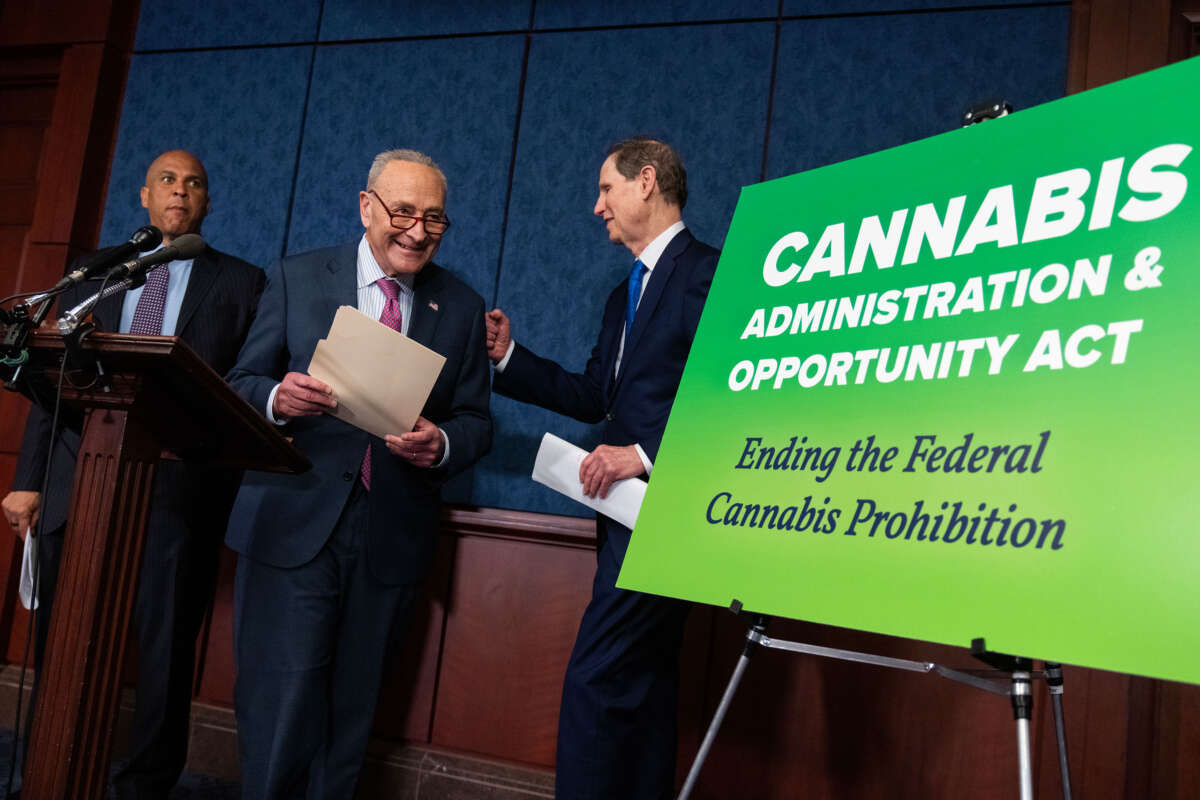Senate Democrats reintroduced legislation this week that seeks to decriminalize cannabis across the U.S., just one day after the Biden administration announced plans to reschedule the drug to a less restrictive classification level.
The Cannabis Administration and Opportunity Act was submitted to the Senate on Wednesday by Sens. Chuck Schumer (D-New York), Ron Wyden (D-Oregon) and Cory Booker (D-New Jersey). The bill would remove cannabis from being regulated at the federal level under the Controlled Substances Act, and would allow state governments to regulate marijuana use how they see fit.
The bill would also transfer federal oversight of cannabis from the Drug Enforcement Administration (DEA) to the Food and Drug Administration (FDA) and the Alcohol and Tobacco Tax and Trade Bureau, allowing marijuana to be regulated in the same way as alcohol and tobacco products are.
A small tax on cannabis sales would also be imposed at different levels, depending on the size of the business conducting the transactions. Funds from the taxes would go toward investing in people and communities disproportionately affected over the past several decades by the federal war on drugs.
Past convictions for low-level federal cannabis-related crimes would be removed from people’s criminal records under the proposal, and individuals currently incarcerated for such crimes could petition a court for a resentencing hearing.. The bill would also create programs to prevent the use of cannabis by young people, and would encourage federal health agencies to research the benefits of marijuana.
“It’s time for Congress to wake up to the times and do its part by passing the cannabis reform that most Americans have wished for,” Schumer said in a statement regarding the legislation. “It’s past time for Congress to catch up with public opinion and to catch up with the science.”
“Our comprehensive Cannabis Administration and Opportunity Act doesn’t tell states what to do — but it provides them with the tools to effectively implement the laws their voters and legislators choose. Public health, public safety, opportunity and social justice must be at the core of any cannabis reform proposal, and it’s crucial stakeholders continue to have a seat at the table,” Wyden said.
“Thousands of people have suffered at the hands of our broken cannabis laws, and the Cannabis Administration and Opportunity Act would finally dismantle the outdated federal marijuana prohibition, expunge past convictions for people with low-level cannabis offenses, and ensure restorative justice for communities impacted by the War on Drugs,” Booker added.
Although cannabis reform and legalization is widely popular — polling shows that 88 percent back legalizing marijuana for both medical and recreational purposes — passage of the bill this year is highly unlikely, given the current political divides in Congress and Republicans’ deep opposition to decriminalization. GOP senators would likely block the legislation from moving forward using the filibuster, and in the House, Republicans, who control that legislative chamber, would probably table the measure entirely.
Still, the reintroduction of the measure indicates that the issue could become part of the broader 2024 election season, including in congressional elections and the presidential contest.
The reintroduction of the bill comes just one day after news that the Biden White House was hinting at reclassifying cannabis away from Schedule I on the DEA’s list of controlled substances to the less stringent Schedule III list. The move wouldn’t legalize the drug under federal law, but would make it easier to study its effects and ease the financial strains that cannabis-related businesses face in states where it has been legalized.
While not promoting huge or deeply impactful changes, President Joe Biden has differentiated himself from former President Donald Trump on the issue of drug reform. Whereas Trump has expressed a desire to apply capital punishment to those who commit some drug crimes, Biden has spoken candidly about the need to decriminalize marijuana and pardoned thousands in 2022 who were convicted with low-level cannabis crimes, for example.
“Criminal records for marijuana use and possession have imposed needless barriers to employment, housing and education opportunities,” Biden said in 2023. “Too many lives have been upended because of our failed approach to marijuana. It’s time that we right these wrongs.”
Trump is silencing political dissent. We appeal for your support.
Progressive nonprofits are the latest target caught in Trump’s crosshairs. With the aim of eliminating political opposition, Trump and his sycophants are working to curb government funding, constrain private foundations, and even cut tax-exempt status from organizations he dislikes.
We’re concerned, because Truthout is not immune to such bad-faith attacks.
We can only resist Trump’s attacks by cultivating a strong base of support. The right-wing mediasphere is funded comfortably by billionaire owners and venture capitalist philanthropists. At Truthout, we have you.
Truthout has launched a fundraiser, and we have only 24 hours left to raise $15,000. Please take a meaningful action in the fight against authoritarianism: make a one-time or monthly donation to Truthout. If you have the means, please dig deep.
